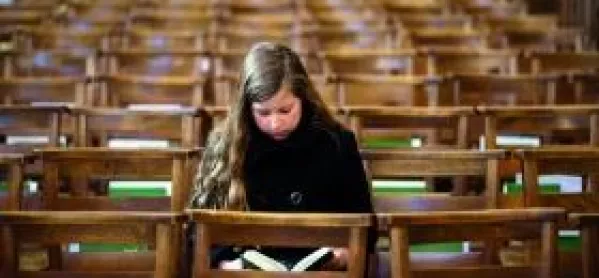Morality - Religious education needs a leap of faith, report warns

Many schools are failing to teach students about the role of religion in Scottish society, with secondaries, in particular, taking too cautious an approach to the subject, a study published today warns.
Some older students are being denied their statutory right to religious and moral education (RME) - the subject’s official name in non- denominational schools - according to the curriculum impact report by Education Scotland.
Catholic schools are marked out for praise, with the report commending their work in using religious education to promote ideas of social justice and to tackle sectarianism.
But many S4-6 students across Scotland receive no RME, even though they have a statutory right to it. This “potentially has serious consequences for society in that too many young people are not deepening their knowledge and understanding of the diversity of religions and beliefs within (Scotland)”, the report states.
Nurseries and primaries are praised for RME in which most children “participate enthusiastically in celebrations which are important to themselves or others in their school”. The subject often helps children to “work together and communicate effectively”, and they “are increasing their understanding of sectarianism and approaches to combat this”, it adds.
Effective provision has helped older students to engage with recent media debates around marriage, sectarianism and capitalism, the report finds, as it fosters “skills of reflection, analysis and evaluation, which support (students) in making well-informed judgements about their own stances in life”.
Catholic schools’ religious education provides “opportunities to explore sectarianism. and other issues of equality, inclusion and diversity through links with non-denominational partner schools and with international partner schools”, the report says.
South Ayrshire head of education Douglas Hutchison, a former religious education teacher and inspector who did fieldwork for the report, said: “It would certainly be my view that Catholic schools don’t contribute to sectarianism. The more young people understand religion, and other people’s religion, the more you tackle sectarianism and bigotry of any kind. I think that’s what religious education does.”
But while Catholic schools take a more immersive approach to religious education - almost all primary children are “deepening their understanding of Gospel values through personal reflection supported by prayer and liturgy” - RME is generally built on the premise that respect for others’ beliefs should come “from a position of distance”.
The report deems this “not good enough”: students in a “significant” number of schools “need more opportunities to develop their own beliefs and values” through learning about religions and other world views, it claims.
The quality of secondary RME is patchy, the report shows. Some young people described their experiences as “boring and questioned the value of the subject”. Limited staffing has held RME back, and many teachers feel “isolated and not well led”.
Stephen McKinney, a senior lecturer and expert on sectarianism at the University of Glasgow’s School of Education, was wary of drawing definitive conclusions from the report - which took evidence from 60 schools - and said that there many non-denominational schools where excellent RME was tackling issues such as sectarianism. However, the overall report was “quite positive and encouraging”, Dr McKinney said.
Mr Hutchison commented that he saw lots of good RME but was “not convinced that it’s pulled together at any significant level or that there’s any sign of leadership locally or nationally”.
But there is a growing appetite for the subject at exam level. Uptake of the Higher in religious, moral and philosophical studies grew from 1,751 students in 2007 to 4,144 in 2013.
This could be partly explained by satisfying a teenage demand to make sense of a complex and global world, said Jim Whannel, a Glasgow quality improvement officer and member of the group behind the report.
RME worked best when addressing issues that resonated with students such as war and poverty, he said, and encouraged them to develop ideas in a way that other subjects might not: “It’s not enough to have an opinion. You’ve got to explore it further and make reasoned arguments.”
Keep reading for just £1 per month
You've reached your limit of free articles this month. Subscribe for £1 per month for three months and get:
- Unlimited access to all Tes magazine content
- Exclusive subscriber-only stories
- Award-winning email newsletters



